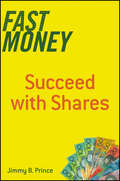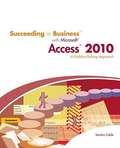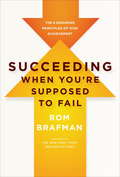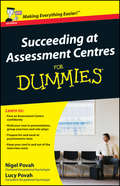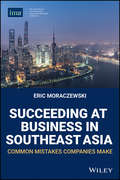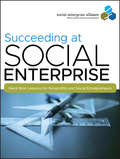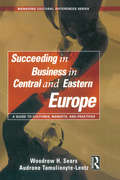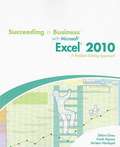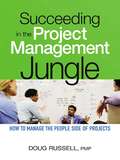- Table View
- List View
Subway Energy-Efficient Management (Uncertainty and Operations Research)
by Xiang Li Xin YangThis book provides a comprehensive presentation on energy-efficient management in urban rail transit system via operations research and uncertain optimization methods. It is suitable for researchers, engineers, and students in the fields of transport management. The readers will learn numerous new modeling ideas on reducing tractive energy consumption and improving regenerative energy utilization, and find this work a useful reference.
Succeed
by Halvorson Heidi GrantRead Heidi Grant Halvorson's blogs and other content on the Penguin Community. Just in time for New Year's resolutions, learn how to reach your goals-finally-by overcoming the many hurdles that have defeated you before. Most of us have no idea why we fail to reach our goals. Now Dr. Heidi Grant Halvorson, a rising star in the field of social psychology shows us how to overcome the hurdles that have defeated us before. Dr. Grant Halvorson offers insights-many surprising-that readers can use immediately, including how to: • Set a goal so that you will persist even in the face of adversity • Build willpower, which can be strengthened like a muscle • Avoid the kind of positive thinking that makes people fail The strategies outlined in this book will not only help everyone reach their own goals but will also prove invaluable to parents, teachers, coaches, and employers. Dr. Grant Halvorson shows readers a new approach to problem solving that will change the way they approach their entire lives. Watch a Video .
Succeed Without Selling: The More You Think About Selling, the Less You Will Sell
by Diane HelbigA twenty-first–century sales philosophy that “gets straight to the point about what works, and what doesn’t work in today’s marketplace” (Kevin Kruse, New York Times-bestselling author of 15 SecretsSuccessful People Know About Time Management, Founder and CEO of LeadX).Being successful at sales has nothing to do with “selling.” The best salespeople are the ones who are always curious—not always closing. Succeed Without Selling contains everything a small business owner or sales professional needs to know about what it takes to be successful. From prospecting to discovery to referrals and strategic alliances, it’s all covered. There are even chapters for sales managers, direct sellers, and service providers.Succeed Without Selling also includes resources like sample scripts and proposal templates. Anyone who wants to grow their business will find actionable, easy-to-follow information to help them embrace the value of being more interested in others than in making the sale. Succeed Without Selling changes the way readers look at the sales process forever—and stops them from engaging in behaviors that just don’t work.
Succeed with Shares
by Jimmy B. PrinceDo your finances control you? Frustrate you? Limit you? Well take control of your money today and get more of what you want from life. Bestselling author, Jimmy B. Prince guides you through the ins and out of investing in and profiting from shares. Fast Money: Succeed with Shares is a jargon-free, practical guide that will get you confidently investing in the share market and on the road to financial freedom, fast!
Succeed with Social Media Like a Creative Genius: A Guide for Artists, Entrepreneurs, and Kindred Spirits (Like a Creative Genius)
by Brainard CareyHow to Build a Following, Make Authentic Connections, and Promote Your Work Whether you’re an artist or craftsman selling your work, the owner of a small start-up hoping to network, or just looking for a more meaningful social media experience, this is the book for you. Brainard Carey draws from his experience and interviews with others to show creative people how to make the most of their time on outlets like Twitter, Facebook, and Instagram. Readers will learn how to develop social media campaigns that reflect their personalities, share their unique offerings, and achieve their goals. Chapter topics include: Building a following Maintaining an authentic image Creative ways to share information Using social media to earn a living And much more With chapters focusing on practical how-tos and real-world examples, Succeed with Social Media Like a Creative Genius™ provides readers with both instructive and demonstrative lessons in making the most of their online presence. Everyone can do it with the right tools, and Carey offers an insider's guide to an otherwise daunting process. This book will awaken and nurture the creative genius in everyone.
Succeed: How We Can Reach Our Goals
by Carol S. Dweck Heidi Grant HalvorsonRead Heidi Grant Halvorson's blogs and other content on the Penguin Community. <P> Just in time for New Year's resolutions, learn how to reach your goals-finally-by overcoming the many hurdles that have defeated you before. <P> Most of us have no idea why we fail to reach our goals. Now Dr. Heidi Grant Halvorson, a rising star in the field of social psychology shows us how to overcome the hurdles that have defeated us before. <P> Dr. Grant Halvorson offers insights-many surprising-that readers can use immediately, including how to: <P> • Set a goal so that you will persist even in the face of adversity <P> • Build willpower, which can be strengthened like a muscle <P> • Avoid the kind of positive thinking that makes people fail <P> The strategies outlined in this book will not only help everyone reach their own goals but will also prove invaluable to parents, teachers, coaches, and employers. Dr. Grant Halvorson shows readers a new approach to problem solving that will change the way they approach their entire lives.
Succeed: How We Can Reach Our Goals
by Carol S. Dweck Heidi Grant HalvorsonRead Heidi Grant Halvorson's blogs and other content on the Penguin Community. Just in time for New Year's resolutions, learn how to reach your goals-finally-by overcoming the many hurdles that have defeated you before. Most of us have no idea why we fail to reach our goals. Now Dr. Heidi Grant Halvorson, a rising star in the field of social psychology shows us how to overcome the hurdles that have defeated us before. Dr. Grant Halvorson offers insights-many surprising-that readers can use immediately, including how to: * Set a goal so that you will persist even in the face of adversity * Build willpower, which can be strengthened like a muscle * Avoid the kind of positive thinking that makes people fail The strategies outlined in this book will not only help everyone reach their own goals but will also prove invaluable to parents, teachers, coaches, and employers. Dr. Grant Halvorson shows readers a new approach to problem solving that will change the way they approach their entire lives.Watch a Video
Succeeding Generations: Realizing the Dream of Families in Business
by Ivan LansbergFinding the right successor to a well-loved founder or president is often the most difficult task an organization can face--and the challenge can be even greater for family-run businesses. Succeeding Generations explores leadership transitions in family businesses, offering a clear-eyed assessment of the different options, from direct succession to building partnerships between siblings and cousins. Family-owned companies may dominate the worldwide business landscape, yet surprisingly few are successfully passed down from one generation to the next, and fewer still reach the third generation intact. Author Ivan Lansberg, an organizational psychologist who grew up in a family business, examines the reasons behind this high failure rate and reveals the factors that contribute to long-term success. He offers practical advice on how to mentor successors, how to set up a systematic selectionprocess, and how to make the best use of the board of directors during times of transition. With a wealth of examples from companies in the United States, Europe, and Latin America,Succeeding Generations provides a thoughtful and comprehensive look at the sensitive dynamics of leadership succession in family businesses.
Succeeding In Business With Microsoft Access 2010: A Problem-solving Approach
by Sandra CableSUCCEEDING IN BUSINESS WITH MICROSOFT ACCESS 2010 prepares your students to solve business problems by moving beyond the basic "point and click" skills to think critically about realistic business situations. When students combine software analysis with their own decision making abilities, they are more likely meet any business challenge with success. The Succeeding in Business Series emphasizes problem-solving, critical thinking, and analysis - challenging students to find efficient and effective solutions.
Succeeding When You're Supposed to Fail
by Rom BrafmanIN COUNTLESS STUDIES, PSYCHOLOGISTS HAVE DISCOVERED A SURPRISING FACT: For decades they assumed that people who face adversity--a difficult childhood, career turbulence, sudden bouts of bad luck--will succumb to their circumstances. Yet over and over again they found a significant percentage are able to overcome their life circumstances and achieve spectacular success. How is it that individuals who are not "supposed" to succeed manage to overcome the odds? Are there certain traits that such people have in common? Can the rest of us learn from their success and apply it to our own lives? In Succeeding When You're Supposed to Fail, Rom Brafman, psychologist and coauthor of the bestselling book Sway, set out to answer these questions. In a riveting narrative that interweaves compelling stories from education, the military, and business and a wide range of groundbreaking new research, Brafman identifies the six hidden drivers behind unlikely success. Among them: *The critical importance of the Limelight Effect--our ability to redirect the focus of our lives to the result of our own efforts, as opposed to external forces *The value of a satellite in our lives--the remarkable way in which a consistent ally who accepts us unconditionally while still challenging us to be our best can make a huge difference *The power of temperament--people who are able to tunnel through life's obstacles have a surprisingly mild disposition; they don't allow the bumps in the road to unsettle them By understanding and incorporating these strat-egies in our own lives, Brafman argues, we can all be better prepared to overcome the inevitable obstacles we face, from setbacks at work to chall-enges in our personal lives.
Succeeding at Assessment Centres For Dummies
by Lucy Povah Nigel PovahIt's becoming more common for organisations to use assessment centres as part of their recruitment drive. So if you've recently been invited to one, and you're not sure what to expect or how to excel, then this is the book for you. You'll be guided through how each activity is conducted and how to prepare for each part of the selection process. You'll find expert advice on how to shine in every activity - and get the career you want.Succeeding at Assessment Centres For Dummies covers:Standing Out in Group ExercisesImpressing in Oral PresentationsAchieving in Analysis ExercisesPerforming in Planning and Scheduling ExercisesPerfecting Your Approach to Psychometrics
Succeeding at Business in Southeast Asia: Common Mistakes Companies Make
by Eric MoraczewskiSucceeding at Business in Southeast Asia walks readers through the steps necessary to build and execute a market entry strategy into Southeast Asia, similar to what Eric Moraczewski did with his clients at FDI Strategies. Step by step, readers will learn about the top five pitfalls as well as common areas of concern and mistakes that can be avoided. These can be internal or external issues, country-specific or endemic to the region, but they all are issues Moraczewski solved regularly with clients and other businesses around the globe. Where possible, examples based on his own career experience are used to help reveal the bigger picture and affirm that everyone can, and often times will, make mistakes. Written with humanity and conversational clarity, Moraczewski&’s book delves into critical topics such as relationship-building, power structures, and the role culture plays in economic value and ethical standards. He inspires would-be investors by tapping into universal human behaviors and shows how they can be leveraged to make the right business connections abroad. Additional topics include: Joint ventures Franchising strategy Small businesses breaking into Asia Lessons to bring back from foreign markets
Succeeding at Social Enterprise
by Social Enterprise AllianceFrom the Social Enterprise Alliance, the organization dedicated to building a robust social enterprise field, comes Succeeding at Social Enterprise. This practical guide is filled with the best practices, tools, guidance, models and successful cases for leaders (and future leaders) of social ventures and enterprises. A groundbreaking work, it brings together the knowledge and experience of social enterprise pioneers in the field and some of today's most successful social entrepreneurs to show what it takes to implement and run an effective social venture or organization. Succeeding at Social Enterprise focuses on real life examples, lessons learned and the core competencies that are needed to run a social venture in a nonprofit, highlighting such skills as managing and leading, business planning, marketing and sales, and accounting.Praise for Succeeding at Social Enterprise"This is a must read for anyone starting or growing a social enterprise. The lessons learned offer valuable, practical and real insights from pioneers in the field. The frameworks and tools presented can be implemented immediately to help drive success and expand your social impact."--Kriss Deiglmeier, executive director, Center for Social Innovation, Stanford Graduate School of Business"By successfully weaving together the best thinking and advice from a diverse set of our field's leading experts and practitioners, Succeeding at Social Enterprise will be the new 'must have' handbook for Social Enterprise."--Jed Emerson, www.BlendedValue.org"This is a timely book needed for a movement that's taking off. The leading thinkers and top practitioners in this book make today's pressing issues clear to both the novice and the experienced social entrepreneur."--Kevin Jones, founding principal, Good Capital"Written by the nation's leading experts on starting, building and leading a successful social venture, this book is a profoundly important contribution to the growing body of literature on social entrepreneurship. No other book brings to bear this kind of business experience, practical advice and wisdom on the challenges of creating and sustaining a social enterprise."--David Roll, founder, Lex Mundi Pro Bono Foundation
Succeeding in Academic Medicine: A Roadmap for Diverse Medical Students and Residents
by John P. SánchezThis first-of-its-kind book for underrepresented racial and ethnic minorities (URM), women, and sexual and gender minorities in medicine offers the core knowledge and skills needed to achieve a well-planned, fulfilling career in academic medicine. The knowledge and skills provided by the esteemed co-authors, successful diverse pre-faculty, and junior and senior academicians, are complemented by their inspirational and motivational stories. Increasing diversity in the academic medicine workforce has been identified and embraced as a core value of institutional excellence at nearly all academic institutions and professional associations. Despite this established core value, certain groups such as Black/African-American, Latino/Hispanic, American Indian/Alaska Native-identified individuals, women, and sexual and gender minorities, are still present in lower proportions compared with the general population and lack inclusion. In 12 chapters and with a unique focus on a practical approach to increasing diversity and inclusion in academic medicine, this book demystifies the often-insular world of academic medicine. It comprehensively outlines career opportunities and associated responsibilities, how to transform academic-related work to scholarship, and offers a clear and transparent look into the academic appointment and promotion process. By focusing on the practical steps described in this handy book, students and residents can develop a strong foundation for an academic medicine career and succeed in becoming the next generation of diverse faculty and administrators.
Succeeding in Business in Central and Eastern Europe
by Woodrow H. Sears Audrone Tamulionyte-LentzIn Central and Eastern Europe, the 'Old Europe' of cobblestones co-exists with mobile phones, horse carts fight for road space with cars, and farmers' markets compete with mega-stores.Western business professionals hoping to expand or start up new ventures in this complex environment must possess knowledge that is both comprehensive and subtle. What is it like to live and work in Central and Eastern Europe? How is business conducted there? What happened in Central and Eastern Europe to make integration into the rest of Europe so difficult? What important social and cultural issues must be mastered by Westerners hoping to flourish in this region? 'Succeeding in Business in Central and Eastern Europe', the fourteenth title in the 'Managing Cultural Differences Series' answers these and many other questions. This book identifies a variety of factors, including an anti-business attitude and a resistance to Western-style change, that hinder some attempts at development within Central and Eastern Europe. It provides a frame of reference for understanding the "post-Soviet syndrome" - with its remnants of corruption and mistrust of managers and customers alike - that continues to haunt the countries of CEE. Dr. Sears and Ms. Tamulionyte-Lentz give readers solutions for overcoming the problems inherent in this region. They explain how Western executives can build relationships and find point of cultural "synthesis" with their Central and Eastern European counterparts and ultimately create a new and mutually beneficial work culture with their ventures.With understanding and insights on the cultural nuances of the region, 'Succeeding in Business in Central and Eastern Europe' can help all Western visitors, even tourists, who arrive at this increasingly popular destination.
Succeeding in Business with Microsoft Excel 2010: A Problem-solving Approach
by Debra Gross Frank Akaiwa Karleen NordquistSUCCEEDING IN BUSINESS WITH MICROSOFT OFFICE EXCEL 2010 prepares your students to solve business problems by moving beyond the basic "point and click" skills to think critically about realistic business situations. When students combine software analysis with their own decision making abilities, they are more likely meet any business challenge with success. The Succeeding in Business Series emphasizes problem-solving, critical thinking, and analysis - challenging students to find efficient and effective sol
Succeeding in Life and Career, Foundations of Human Studies
by Frances Baynor ParnellSucceeding in Life and Career is an advanced comprehensive text designed to help teens adjust to change, especially as they become young adults. A lifespan development chapter provides understanding of how people change over time, from newborn to older adult. Career readiness is stressed, and each of the 16 career clusters is explored along with related jobs and their requirements for success. Skills development, financial literacy, healthy lifestyles, housing, and transportation topics are also included. Students gain hands-on experience building a portfolio by completing chapter projects, preparing them to create employment portfolios in the future. Critical thinking features found throughout the book develop student college and career readiness skills. Classroom learning and FCCLA participation are encouraged through chapter ending activities.
Succeeding in Life and Career: Foundations Of Human Studies
by Frances Baynor ParnellNIMAC-sourced textbook
Succeeding in Life and career: Foundations of Human Studies
by Frances Baynor ParnellSucceeding in Life and Career is an advanced comprehensive text designed to help teens adjust to change, especially as they become young adults. A lifespan development chapter provides understanding of how people change over time, from newborn to older adult. Career readiness is stressed, and each of the 16 career clusters is explored along with related jobs and their requirements for success. Skills development, financial literacy, healthy lifestyles, housing, and transportation topics are also included. Students gain hands-on experience building a portfolio by completing chapter projects, preparing them to create employment portfolios in the future. Critical thinking features found throughout the book develop student college and career readiness skills. Classroom learning and FCCLA participation are encouraged through chapter ending activities.
Succeeding in the Project Management Jungle: How to Manage the People Side of Projects
by Doug RussellIt is no secret that the world of project management is wrought with high stress and complex coordination. In this book Russell, director of engineering at a fortune 200 company, provides entry-level project managers with important instruction on navigating the rugged jungle of people management. Russell uses the TACTILE Management(tm) (Transparency, Accountability, Communication, Trust, Integrity, Leadership, and Execution) system along with his own 25 years of experience as a project manager to impart valuable management instruction. Annotation ©2011 Book News, Inc. , Portland, OR (booknews. com)
Succeeding in the World of Work
by Ben S. Vineyard Gady KimbrellVocational Guidance textbook for high school students
Succeeding in the World of Work
by Grady KimbrellThe text that explores career options and life choices. . . and how to succeed! Succeeding in the World of Work prepares your students for the complex issues they'll face in the rapidly changing workplace. This updated and comprehensive program now includes 16 Career Pathways outlined by the U. S. Department of Education.
Succeeding in the World of Work (4th Edition)
by Ben S. Vineyard Gady KimbrellVocational Guidance textbook for high school students
Succeeding in the World of Work (7th edition)
by Grady Kimbrell Ben S. VineyardThis updated and comprehensive program prepares students for the complex issues they'll face in the rapidly changing workplace.
Succeeding in the World of Work: Student Activity Workbook
by Glencoe McGraw-Hill StaffIncludes: note-taking activities based on the Cornell note-taking model, real-world applications, personal academic and career portfolio activities, 21st century skills, foundation skills, and workplace competencies correlations, academic applications, study skills activities, test-prep and test-taking practice.



